PROPORTIONAL PARTS AND SCALE FACTOR
When you compare the lengths of corresponding sides of similar figures, we usually get a numerical ratio.
This ratio is called the scale factor for the two figures.
Problem 1 :
Some special effects in movie are created using miniature models. In a recent movie, a model sports utility (SUV) 22 inches long was created to look like a real 14 2/3 foot SUV. What is the scale factor of the model compared to the real SUV ?
Solution :
Converting foot to inches :
1 foot = 12 inches
14 2/3 foot = 14 2/3 x 12 inches
= (44/3) x 12
= 176 inches
Scale factor = Length of miniature / length of original
= 22/176
= 1/8
So, the model is 1/8 of the real.
Problem 2 :
The two polygons are similar, write similarity statement and find x, y and UT.
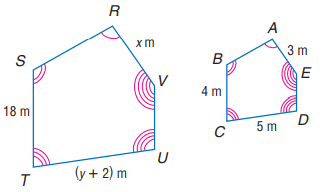
Solution :
From the given information polygons RVUTS and ABCDE are similar.
RV and AE are corresponding sides. ST and BC are corresponding sides.
ST/BC = 18/4 ==> 9/2
The two polygons are in the ratio 9 : 2
RV/AE = x/3 ---(1)
Equating (1) to scale factor,
x/3 = 9/2
x = 13.5
TU/CD = (y + 2)/5 ---(2)
Equating (2) to scale factor
(y + 2)/5 = 9/2
2(y + 2) = 9(5)
2y + 4 = 45
2y = 45 - 4
2y = 41
y = 41/2
y = 20.5
UT = y + 2
UT = 20.5 + 2 ==> 22.5
Problem 3 :
Each pair of polygons is similar. Write a similarity statement, find x and measures of indicated sides and scale factor.
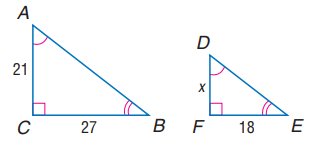
Solution :
BC/EF = 27/18 ---(1)
AC/DF = 21/x ---(2)
(1) = (2)
27/18 = 21/x
27x = 21(18)
x = 14
Scale factor :
BC/EF = 27/18
BC/EF = 3/2
So, the required scale factor is 3 : 2.
Problem 4 :
Each pair of polygons is similar. Write a similarity statement, find x and measures of indicated sides and scale factor. Find the lengths of FE, EH and GF.
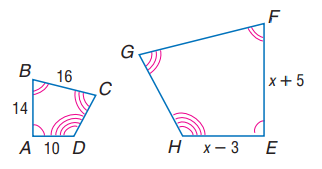
Solution :
AD/HE = AB/EF
10/(x - 3) = 14/(x + 5)
10(x + 5) = 14(x - 3)
10x + 50 = 14x - 42
10x - 14x = -42 - 50
-4x = -92
x = 23
FE = x + 5 ==> 28
EH = x - 3 ==> 20
AD/HE = 10/20 ==> 1/2
So, the scale factor is 1/2.
BC = 1/2 of GF
16 = (GF/2)
GF = 32
Each pair of polygons is similar. Write a similarity statement, find x and measures of indicated sides and scale factor.
Problem 5 :
Find the lengths of AB and CD.
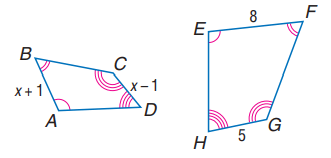
Solution :
DC/HG = AB/EF
(x - 1)/5 = (x + 1)/8
8(x - 1) = 5(x + 1)
8x - 8 = 5x + 5
8x - 5x = 5 + 8
3x = 13
x = 13/3
|
AB = x + 1 = (13/3) + 1 AB = 16/3 |
CD = x - 1 = (13/3) - 1 CD = 10/3 |
Problem 6 :
Find AC and CE.
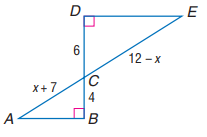
Solution :
∠ACB = ∠DCE
∠CBA = ∠CDE
The triangles ACB and DCE are similar.
AC/EC = BC/DC
(x + 7) / (12 - x) = 4/6
6(x + 7) = 4(12 - x)
6x + 42 = 48 - 4x
6x + 4x = 48 - 42
10x = 6
x = 6/10
x = 0.6
AC = 0.6 + 7 => 7.6
CE = 12 - 0.6 => 11.4
Problem 7 :
Find BC and ED.
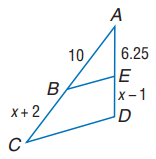
Solution :
The triangles ABE and ACD are similar.
AB/AC = AE/AD
10/(x + 2 + 10) = 6.25/(x - 1 + 6.25)
10/(x + 12) = 6.25/(x + 5.25)
10(x + 5.25) = 6.25(x + 12)
10x + 52.5 = 6.25x + 75
10x - 6.25x = 75 - 52.5
3.75x = 22.5
x = 6
AC/EC = BC/DC
(x + 7) / (12 - x) = 4/6
6(x + 7) = 4(12 - x)
6x + 42 = 48 - 4x
6x + 4x = 48 - 42
10x = 6
x = 6/10
x = 0.6
AC = 0.6 + 7 => 7.6
CE = 12 - 0.6 => 11.4
Recent Articles
-
Finding Range of Values Inequality Problems
May 21, 24 08:51 PM
Finding Range of Values Inequality Problems -
Solving Two Step Inequality Word Problems
May 21, 24 08:51 AM
Solving Two Step Inequality Word Problems -
Exponential Function Context and Data Modeling
May 20, 24 10:45 PM
Exponential Function Context and Data Modeling